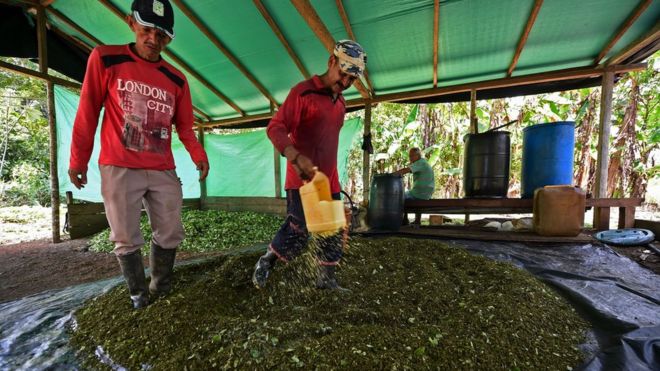Drones hunt cocaine farms in Colombia
The Colombian government has started to use drones to destroy the plants that produce cocaine.
Small aircraft loaded with herbicide are being sent to search for illegal fields of coca.President Iván Duque has favoured the use of the unmanned aircraft to ensure that damage to neighbouring crops is kept to a minimum.
Critics have warned that the approach may be a technological fix to a problem that needs a political solution.
The Wall Street Journal reported that Colombian authorities had partnered with drone company Fumi Drones SAS to provide unmanned aircraft as well as to train police.
German Huertas, the drone company's director of operations, said the drones had eliminated about 90% of the coca on each acre (0.4 hectare) targeted during tests in the country's Narino province.
The trial has involved the deployment of 10 drones, each weighing 23kg (51lb) and carrying the plant-killing chemical glyphosate. The measures form part of President Duque's push to eradicate cocaine production in Colombia.
In June, the US Office of National Drug Control Policy (ONDCP) released figures indicating coca growth in the country had reached an all-time high, with an 11% increase from 465,000 acres in 2016, to 516,000 acres in 2017.
At the time, ONDCP deputy director Jim Carroll said: "President Trump's message to Colombia is clear: the record growth in cocaine production must be reversed."
Mr Duque's predecessor, Juan Manuel Santos, suspended aerial fumigation using glyphosate in 2015, following warnings by the World Health Organization (WHO) that the chemical could be linked to cancer.
A report from the United Nations (UN) and the WHO in 2016 went against this finding, concluding that glyphosate was "unlikely to pose a carcinogenic risk to humans from exposure through the diet".
Following the ONDCP's report, the outgoing Mr Santos approved the use of drones to find and destroy coca crops. He said that because of the height of the operations the unmanned aircraft would "simulate ground, not aerial, fumigation".
"Political ramifications"
The unmanned nature of the drones means confrontations with farmers are unlikely to pose a danger to operating crews, while their size means they can manoeuvre close to the ground to identify illegal crops.Experts have urged caution, however, about relying on technology to fix a problem with deep social roots. Writing for the Brookings Institution think tank, foreign policy expert Vanda Felbab-Brown says targeting with drones "does not avoid the vast political ramifications of forced eradication".
She calls on the Colombian government to invest in alternative livelihoods for those involved in coca cultivation.
"It's a short-term solution," says Richard Lapper, associate fellow in the US and Americas programme at the Chatham House think tank. "Ultimately, there's a lot of international demand for cocaine."
In recent years there has been a surge in initiatives to use drones to combat criminal activity. Unmanned aircraft have previously been used to track wildlife and identify poachers across reserves in South Africa, while a Moroccan start-up is currently trialling the use of autonomous drones to scan for illegal fishing in the Seychelles.
Drones have also been used on the other side of the drug trade. Unmanned aircraft have been filmed delivering illicit substances to prisoners in UK jails, and in 2017 US border patrol agents intercepted a methamphetamine shipment that had been dropped using a drone.


Comments
Post a Comment